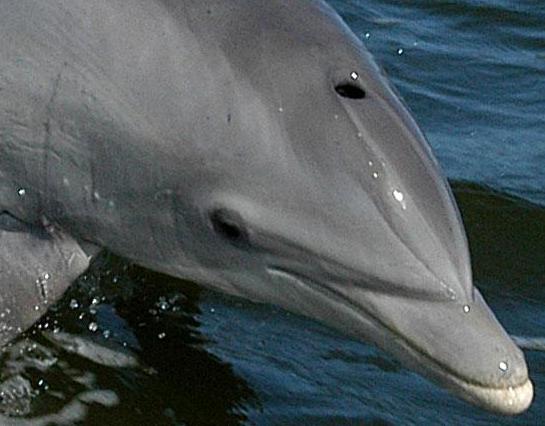 |
| Bottlenose Dolphin (photo courtesy of NASA) |
by B. N. Sullivan
About 25 years ago, while I was a Psychology graduate student at the University of Hawaii, I made several visits to the Kewalo Basin Marine Mammal Laboratory (KBMML) in Honolulu. Those visits were field trips, made in conjunction with an intensive seminar on cognition that I was enrolled in that semester. The main focus of that seminar was human cognition, but along the way we studied comparative animal cognition as well, and my classmates and I visited the KBMML to learn something about dolphin cognition.
What we saw was impressive. At that time, researchers at the lab were just beginning to elucidate the extent of dolphins' ability to comprehend and interpret "an artificial sign language, in which gestures are like words and sequences of gestures are like sentences." Through a series of carefully constructed experiments, the researchers were able to show that dolphins' comprehension of this language went far beyond mere response to commands (such as you would give to a dog to sit, or roll over).
The dolphins were taught to associate hand signs with a corresponding noun object -- e.g., a beach ball, a hula hoop, a surfboard -- and they learned signed verbs, such as fetch, take, and jump. Using these vocabulary items in combination, the dolphins could be instructed to "fetch ball' or "fetch hula hoop" -- and they would select the correct item from among several floating in their pool, and bring it to the trainer.
But it gets better!
Selecting the correct item and fetching it is one thing, but the dolphins also showed an instrumental understanding that went beyond mere association of a given signed word with a corresponding object or behavior. For one thing, they displayed some understanding of syntax. As the folks from the lab explain:
For example, the gestural sequence Surfboard Person Fetch means, "take the person to the surfboard," whereas the sequence Person Surfboard Fetch means the opposite, -"take the surfboard to the person." The grammar used is inverse in its construction, in the sense that the destination object is stated first, then the object to be operated on, and finally the type of operation. This inversion requires the dolphin to receive and process the entire sequence before it can reliably interpret the instruction and organize its response.We also witnessed the dolphins' response -- or lack of response -- to commands that did not make sense. If the trainer signed to the dolphin to "put the beach ball in the hoop," the dolphin obliged. But if the trainer instructed the dolphin to "put the hoop in the beach ball" the dolphin would not respond (beyond giving the trainer a look that clearly implied, "What, are you nuts??").
The more time we spent observing these experiments, the more it became apparent that this was not a case of dolphins trained to do tricks. Rather, it became clear that the dolphins were comprehending, and reasoning, and evaluating situations. [You can read about that research here.]
Those experiences have stayed with me all these years, so it was not too surprising to read recent news articles about subsequent behavioral research with dolphins that concluded that these marine mammals, rather than chimpanzees, could be the most intelligent creatures on Earth after humans. [Physorg.com has a nice review of that research.]
Long ago, I came across this quotation, attributed to British writer Douglas Adams, author of The Hitchhiker's Guide to the Galaxy:
"Man has always assumed that he was more intelligent than dolphins because he had achieved so much -- the wheel, New York, wars, and so on -- while all the dolphins had ever done was muck about in the water having a good time. But conversely, the dolphins had always believed that they were far more intelligent than man -- for precisely the same reason."
they are amazing creatures, and this is really frustrating. WHY ???
ReplyDeleteWhy...who says just the sea?
ReplyDeletehttp://www.youtube.com/watch?v=jc6aufHz-i0
Three-word sentences, with syntax, and that's just the human tongue. I wonder what dolphin-to-dolphin conversation must look like?
ReplyDeleteOne of the reasons that I considered going into marine biology (but, unfortunately, did not) was that I have such a deep respect for dolphins. That they continue to be slaughtered is obscene.
ReplyDeleteAloha Bobbie,
ReplyDeleteYour post and dolphin video - I really enjoyed both a lot - made me immediately remember the movie 'The day of the dolphin' which had watch some 30 years ago. OK it was a scifi thriller but what I liked best was all the beautiful scenes with the dolphins in action. They are just such graceful swimmers, smart creatures and always ready to communicate with us humans.
When you are visitin Hawaii and have a chance on your visit to meet the wild dolphins on a kayak trip at Kealakekua Bay on the Big Island, you won't ever forget this experience. Priceless!
Aloha Pua
Best Hawaii Vacation Blog
Dolphins have always fascinated me but this clip... wow! This was fantastic footage. Wow!
ReplyDelete